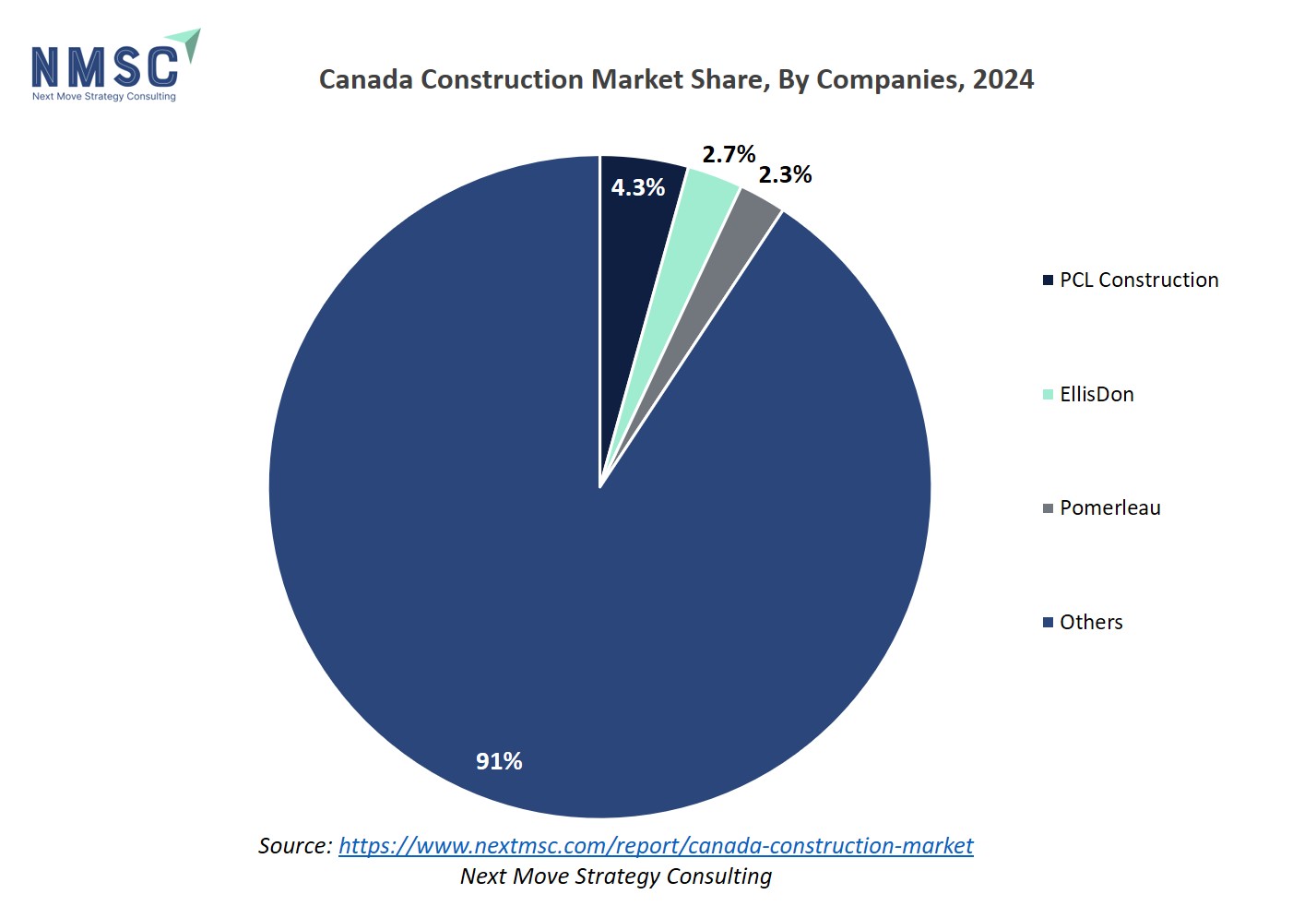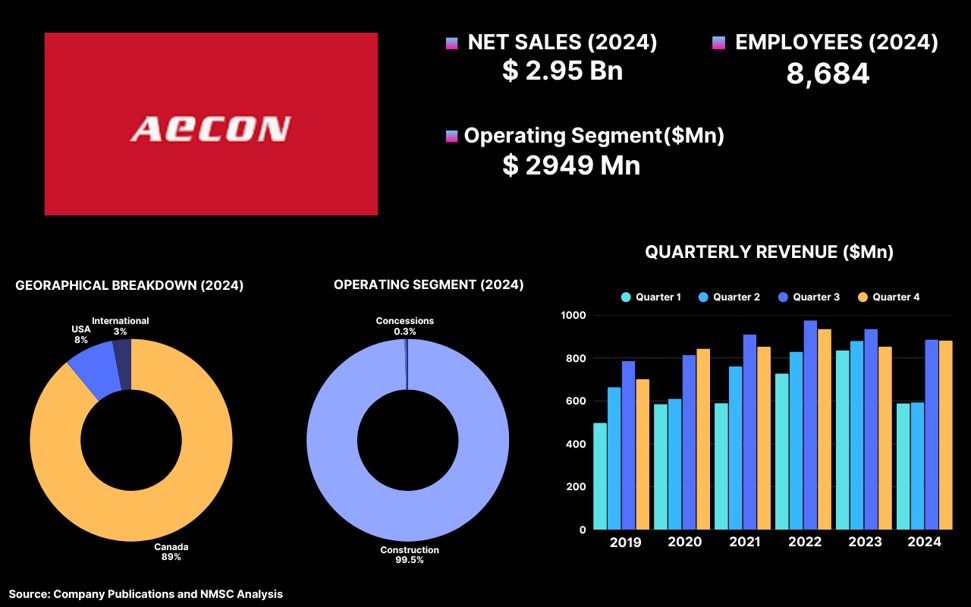How PCL, EllisDon, and Pomerleau Are Shaping Canada’s $350B Construction Industry Future
Published: 2025-09-15

As per NMSC analysis, Canada’s Construction industry is set to maintain strong growth momentum, with the market size expected to reach around USD 349.78 billion by 2030 marking a solid CAGR of 3.36%. Valued at USD 283.63 billion in 2024, the Canada Construction market is projected to rise to USD 296.44 billion by 2025. This growth is being propelled by widespread adoption of Building Information Modeling (BIM) and digital twins, the rise of modular and prefabricated construction techniques, and growing demand for sustainable, energy-efficient buildings. Moreover, an industry-wide push for real-time operational efficiency through data-driven project management, IoT-enabled site monitoring, and cloud-based collaboration platforms is reshaping Canada’s construction landscape and unlocking new opportunities across residential, commercial, and infrastructure sectors.
Canada Construction Market Overview
Canada’s construction market is experiencing steady growth, driven by rapid urbanization, infrastructure renewal, and a surge in mixed-use and high-rise developments in cities such as Toronto, Vancouver, and Calgary. As municipalities invest heavily in transit expansions, green retrofits, and smart-city pilots, developers are prioritizing efficient, sustainable building methods, such as modular construction, mass timber, and net-zero design to meet evolving regulatory standards and market demands.
Technological advancements, including IoT-enabled site monitoring, AI-driven project planning, drone-based inspections, and digital-twin integration are transforming project delivery by enhancing real-time decision-making, safety, and quality control. Concurrently, Canada’s emphasis on green building practices and ambitious climate targets is accelerating the adoption of low-impact materials and energy-efficient systems. With robust public and private investment fueling urban and regional growth, the Canadian construction sector is poised to deliver smarter, faster, and more resilient infrastructure nationwide.
Several major companies dominating the Canada Construction market include PCL Construction, EllisDon, Pomerleau, Graham Construction, Broccolini Construction, Chandos Construction, Maple Reinders Constructors Ltd., and Aecon Group Inc, among others. These industry leaders are at the forefront of transforming Canada’s built environment through their commitment to innovation, sustainable design, and digital construction practices. From adopting Building Information Modeling (BIM) and modular construction to integrating smart infrastructure and green building standards, these firms are driving efficiency, quality, and resilience across a range of residential, commercial, and infrastructure projects. Their investments in advanced construction technologies and collaborative project delivery models position them as key players in shaping Canada’s future cities.
For the in-depth analysis of Canada Construction industry, you can reach out to us at: https://www.nextmsc.com/report/canada-construction-market
Highlights Of Pcl Construction
PCL Construction, headquartered in Edmonton, Alberta, Canada, is a 100% employee-owned group of independent construction companies operating across Canada, the United States, Australia, and the Caribbean. With over 5,200 employees, PCL serves buildings, civil, and industrial markets, leveraging a century-long legacy of innovation, offsite modular manufacturing, and sustainable construction practices. Renowned for its commitment to quality and collaboration, PCL combines advanced digital construction technologies, such as BIM and digital twins with deep local expertise to deliver complex projects on time and on budget, helping clients build enduring, high-performance assets.
On 2025, PCL was named a Platinum Club member in Canada’s Best Managed Companies program, marking 24 consecutive years of top–tier recognition. This accolade reflects PCL’s sustained excellence in leadership, operational performance, and culture, strengthening its reputation among owners and investors. As clients increasingly seek reliable partners capable of integrating cutting-edge technologies and sustainable practices, PCL’s proven track record positions it to secure major infrastructure, commercial, and residential contracts further driving innovation and investment across Canada’s construction sector.
Highlights Of Ellisdon
EllisDon is an employee-owned, integrated construction services company founded in 1951 and headquartered in Mississauga, Ontario. With over 4,500 employees and 15 offices globally, EllisDon delivers cradle-to-grave solutions across buildings, civil, transportation, and industrial markets. Renowned for its emphasis on innovation and sustainability, the firm leverages advanced technologies, such as Building Information Modeling (BIM), digital twin platforms, and offsite modular fabrication to optimize project delivery, reduce risk, and achieve net-zero emissions targets by 2050. Its collaborative culture and deep technical expertise enable EllisDon to execute complex, high-performance projects on time and on budget, from landmark high-rises and healthcare facilities to major infrastructure and renewable energy installations.
On January, 2025, EllisDon partnered with Palantir Technologies to integrate AI-driven analytics into its Insights and Analytics team, enhancing operational decision-making, predictive maintenance, and real-time project monitoring across its portfolio. In parallel, EllisDon is constructing a state-of-the-art modular plant in Stoney Creek, Ontario, capable of producing over one million square feet of prefabricated, fully furnished building modules annually. Together, these initiatives are accelerating the adoption of digital and modular construction methods nationwide, boosting productivity, reducing waste, and enabling faster, more sustainable project delivery throughout Canada.
Highlights Of Pomerleau
Pomerleau is a Canadian leader in the construction industry with over 60 years of experience, operating nearly 200 active project sites and employing more than 5,000 people coast to coast. The company delivers integrated, self-performed services across buildings, civil infrastructure, energy, ports and marine works, and more. Renowned for its commitment to innovation and sustainability, Pomerleau leverages advanced technologies, such as virtual design and construction (VDC), Building Information Modeling (BIM), and off-site modular fabrication, alongside its PX3 training ecosystem to optimize project delivery, reduce risk, and support net-zero targets.
In April 2025, Pomerleau released its 2024 Sustainable Development Report, outlining an ESG strategy built around seven priorities, ranging from accelerating digitization to decarbonizing operations and deepening Indigenous partnerships. By setting clear carbon-reduction goals and committing to sustainable procurement, the company is helping to drive the broader industry toward greener, more resilient construction practices. Concurrently, Pomerleau was awarded the Belleville Terminal redevelopment in Victoria’s Inner Harbour, a flagship marine infrastructure project that showcases its technical expertise and reinforces its role in advancing Canada’s coastal redevelopment and economic growth.
Highlights Of Aecon Group Inc.
Aecon Group Inc. is a publicly traded, North American infrastructure leader with roots dating back to 1877. Headquartered in Toronto, with regional offices in Calgary, Vancouver, and Montreal, Aecon employs over 12,000 people across its Construction and Concessions segments. Its Construction division delivers design-build, EPC, and self-performed services in civil, urban transportation, industrial, nuclear, and utilities markets, while its Concessions arm develops and operates P3 infrastructure projects. Aecon’s integrated approach, combining in-house fabrication, advanced digital workflows (BIM, virtual design), and rigorous EHS standards, enables it to execute landmark projects, from highways and subways to energy storage and airport terminals, on time and on budget.
As of June 2025, Aecon has recently reported a record construction backlog of USD 10.7 billion, largely driven by major new projects including the Scarborough Subway Extension and substantial nuclear contracts such as the Darlington New Nuclear Project and work at the Pickering Nuclear Generating Station. These developments are significantly boosting Canada’s infrastructure sector by expanding transit and clean energy capacity, positioning Aecon as a key player in the modernization of Canada’s construction market.
Highlights Of Graham Construction
Graham Construction & Engineering Inc. is a 100% employee-owned construction solutions partner headquartered in Calgary, Alberta, with annual revenues exceeding USD 4 billion. With over nine decades of experience and more than 200 active project sites across North America, Graham self-performs in buildings, heavy civil, industrial, marine, and mining sectors. The company is recognized for its collaborative delivery model, deep technical expertise, and commitment to innovation, leveraging Building Information Modeling (BIM), digital-twin platforms, off-site modular fabrication, and its patented Municipal Asset Partnership framework to optimize schedules, enhance safety, and meet stringent sustainability objectives.
On March, 2025, Graham finalized its strategic merger with California-based XL Industries, adding over USD 1.4 billion in project backlog and bolstering its heavy-civil and life-sciences capabilities across North America. In May 2025, the Township of Mapleton selected Graham for a USD 29.7 million water and wastewater infrastructure program, delivered through its Municipal Asset Partnership framework to preserve municipal borrowing capacity and accelerate essential upgrades. These milestones underscore Graham’s leadership in complex institutional and municipal projects, reinforcing its role in driving resilience and innovation throughout Canada’s evolving construction landscape.
Highlights Of Broccolini Construction
Broccolini is a third-generation, family-owned integrated real-estate and construction services firm headquartered in Kirkland, Quebec. As a single-source provider, it delivers development, design-build, general contracting, project management, and property-management solutions across industrial, commercial, and residential markets. Renowned for its commitment to quality, open collaboration, and innovative technologies, such as virtual design and construction (VDC), modular fabrication, and BIM—Broccolini offers end-to-end project delivery, from land acquisition and financing through to commissioning and ongoing facility operations.
In 2024, Broccolini completed its USD 75 million Broccolini Corporate Centre in Kirkland, the city’s first LEED-certified commercial facility, demonstrating its leadership in sustainable design and construction standards. Simultaneously, the company broke ground on a pioneering drive-through Pandora Self Storage facility in Brossard, Quebec, incorporating off-site modular components and advanced logistics planning to accelerate delivery and minimize site disruption. These projects underscore Broccolini’s strategic focus on green building and modular methodologies, setting new benchmarks for efficiency and environmental stewardship in Canada’s evolving construction landscape.
Summary Of Canada Construction Market
Canada’s construction market is experiencing dynamic growth, underpinned by strong demographic trends, robust public investment, and rapid technological adoption. Record immigration levels are driving a surge in residential development, from high-rise towers in Toronto and Vancouver to mixed-use and infill projects in smaller centres, while the federal Investing in Canada Plan has committed over USD 116 billion to infrastructure upgrades across transit, water, and civic assets.
At the same time, the industry is undergoing a digital transformation: Building Information Modeling (BIM), digital twins, intralogistics platforms, and AI-driven project management are streamlining workflows, cutting approval and build times by up to 30%, and reducing on-site waste. Modular and off-site prefabrication techniques further accelerate delivery and enhance quality control, while sustainability imperatives, net-zero targets, carbon pricing, and green-retrofit programs are boosting demand for low-impact materials such as mass timber. Together, these factors are fueling a resilient construction sector that’s better equipped to meet Canada’s housing needs, modernize critical infrastructure, and deliver smarter, more efficient, and environmentally responsible projects nationwide.
About the Author
 Mayurima Roy is a seasoned researcher with over two years of experience, specializing in various industry verticals such as elevator market, recycling market, and construction market. With a strong passion for writing, she views blogging as a valuable platform to share her industry insights and expertise. Outside of tracking market trends and developments, Mayurima enjoys crafting, cooking, and exploring her creativity through photography.
Mayurima Roy is a seasoned researcher with over two years of experience, specializing in various industry verticals such as elevator market, recycling market, and construction market. With a strong passion for writing, she views blogging as a valuable platform to share her industry insights and expertise. Outside of tracking market trends and developments, Mayurima enjoys crafting, cooking, and exploring her creativity through photography.
About the Reviewer
 Sanyukta Deb is a seasoned Content Writer and Team Leader in Digital Marketing, known for her expertise in crafting online visibility strategies and navigating the dynamic digital landscape. With a flair for developing data-driven campaigns and producing compelling, audience-focused content, she helps brands elevate their presence and deepen user engagement. Beyond her professional endeavors, Sanyukta finds inspiration in creative projects and design pursuits.
Sanyukta Deb is a seasoned Content Writer and Team Leader in Digital Marketing, known for her expertise in crafting online visibility strategies and navigating the dynamic digital landscape. With a flair for developing data-driven campaigns and producing compelling, audience-focused content, she helps brands elevate their presence and deepen user engagement. Beyond her professional endeavors, Sanyukta finds inspiration in creative projects and design pursuits.

















Add Comment